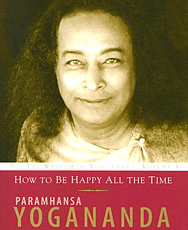Paramhansa Yogandanda (1893-1952), the author of the spiritual classic Autobiography of a Yogi, was one of the first teachers to bring yoga to the West. He practiced direct experience with the Divine which he called "Self-realization." The quotations in this sprightly paperback are taken from material written in the 1930s, from Inner Culture and East West magazines published before 1943, as well as from his original interpretation of The Rubaiyat of Omar Khayyam, edited by Swami Kriyananda, and from notes taken by Swami Kriyananda during his years of living with Yogananda as a close disciple.
This exploration of happiness is organized around chapters on the quest for this elusive quality, the importance of choice, avoiding happiness thieves, learning to behave, simplicity as the key, sharing happiness with others, true success and prosperity, inner freedom and joy, and finding God. Here is a brief sampler of quotations from the book:
• "If you want to be sad, no one in the world can make you happy. But if you make up your mind to be happy, no one and nothing on earth can take that happiness from you."
• "It is important to differentiate between your needs and your wants. Your needs are few, while your wants can be limitless. In order to find freedom and bliss, minister only to your needs. Stop creating limitless wants and pursuing the will-o'-the-wisp of false happiness. The more you depend upon conditions outside yourself for happiness, the less happiness you will experience."
• "For the most part, the senses promise us a little temporary happiness, but give us sorrow in the end. Virtue and inner happiness do not promise much, but in the end always give lasting happiness. That is why I call the lasting, inner happiness of the soul, 'Joy' and the impermanent sense thrills, 'Pleasure.' "
• "Learn to be secretly happy within your heart in spite of all circumstances, and say to yourself, 'Happiness is the greatest divine birthright — the buried treasure of my soul. I have found that I am secretly rich beyond the dream of kings.' "
• "A few years ago, I had a fine musical instrument, an esraj from India. I loved to play devotional music on it. But a visitor one day admired it. Unhesitatingly I gave it to him. Years later someone asked me, 'Weren't you just a little sorry?' 'Never for a moment!' I replied. Sharing one's happiness with others only expands one's own happiness."
• "The most important condition for lasting happiness is even-mindedness. Remain ever calmly centered in the Self, within. As a child's sand castle disintegrates before invading waves, so does a restless mind, lacking strength of will and perseverance, succumb to the pounding it receives from the waves of changing circumstance."
